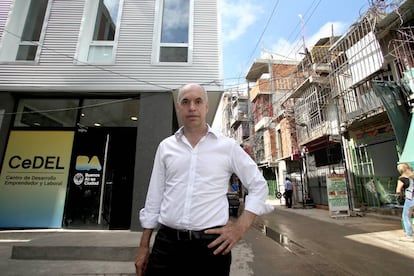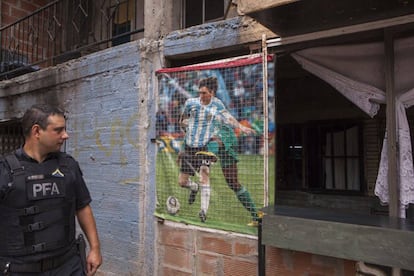Buenos Aires mayor opens office in city’s most notorious slum
Horacio Rodríguez Larreta is heading a project to bring better living conditions to Villa 31

At first it felt really odd. Accustomed as they were to living with their backs to the city, the 40,000 residents of Villa 31, the oldest and best-known shantytown in Buenos Aires, could scarcely believe that it was really Mayor Horacio Rodríguez Larreta they were seeing strolling down their streets.

But slowly, they are getting used to his presence. “Don’t let up, pelado!,” shouts one local business owner as he passes by, making a friendly reference to the mayor’s thinning hair. Other, more desperate residents come up to him to ask for a job.
Larreta has opened up an office in the heart of this slum, which is located not 200 meters from the most expensive neighborhood in Buenos Aires, yet a world away. He comes here almost every week, walking to work and stopping to chat with the locals.
The office itself is a symbol: the modern, three-story building strikes a contrast with the surrounding chaos and poverty, and was built over the ruins of the neighborhood’s best-known drug distribution center.
Not everyone shares this enthusiasm. Reality is very tough inside Villa 31
“This used to be the main headquarters for the drug lords in Villa 31. We want to send out the message that the state is now reaching out to where it didn’t before,” explains Larreta.
That “before” includes the last 10 years, when he was first the deputy mayor to Mauricio Macri, and now that the latter has moved on to bigger things, as mayor himself. During that period of time, Villa 31 expanded like never before, and experienced a notable degradation. But Larreta blames the former president, Cristina Fernández de Kirchner, for that.
“We couldn’t do any construction work, this is state-owned land, and we were at odds. Now Macri has given me permission to enter,” he says.
But the mayor has two adverse forces to reckon with. One is resistance from the locals, who do not trust a power that always aimed to kick them out – residents have been occupying the land since the 1930s, and pay no utility bills for their electricity and water hook-ups. The other problem is resistance from some of the people on the outside, who don’t want their taxes to go into helping Villa 31.

But for most insiders – with the exception of those who live literally under the expressway and whose homes will be demolished – the question marks are beginning to vanish now that they see their houses slowly undergoing improvements, sewers being put in, and drinking water suddenly available.
The city of Buenos Aires is undertaking a complete overhaul of the area, a project that will cost €400 million, of which €170 million are being paid by the World Bank. Authorities are even going to move the freeway route.
“When you come every week, they start to believe you,” notes Larreta. “We are breaking the circle of skepticism in people who were promised things for decades, yet you can see for yourself how things stand.”
As he talks inside his office, the mayor gestures toward the dozens of cables connecting homes, the stagnating water, and the muddy streets. Inside his building, there is a crisp sense of modernity. Outside, there is an unmitigated disaster unbefitting a capital like Buenos Aires.
The city of Buenos Aires is undertaking a complete overhaul of the area, a project that will cost €400 million
“This is an old due for the city,” admits Larreta. That is why the city will transfer its education department, which employs 1,500 municipal workers, into the heart of Villa 31. Right now, there isn’t even a school within this miniature city filled with children.
Most Buenos Aires natives have never set foot inside Villa 31. Most of them drive overhead on the freeway every day, see the abject poverty below, but never come close to it. But Larreta and David Fernández, the head of the project, dream of a day when thousands of city dwellers will come here to buy cheaper fruit and vegetables.
There is an enormous warehouse that is currently used to wash buses. “I imagine it as Barcelona’s Boquería market a few years down the line,” says Larreta. It is hard to envision such a future in the midst of so much dust, noise and scattered trash. But Fernández sees it very clearly: “This is as though Buenos Aires were a large home, and Villa 31 were a room that’s been kept shut for 85 years. It’s a huge opportunity.”
Both men ooze optimism as they offer up a few figures. “In 2015 there were 30 murders in Villa 31. In 2016 there were five. So far this year, none. I won’t say that drugs don’t get sold here, but this is not a drug-controlled area,” asserts Larreta.
Not everyone shares this enthusiasm. Reality is very tough inside Villa 31, and some people fear that any changes will be purely cosmetic, leaving intact the core problem: inequality and social exclusion. A third of all Argentineans are poor, and there sits Villa 31, just 200 meters from La Recoleta, the city’s most exclusive neighborhood, as a reminder of the enormous social differences that are predominant in Latin America.
English version by Susana Urra.
Tu suscripción se está usando en otro dispositivo
¿Quieres añadir otro usuario a tu suscripción?
Si continúas leyendo en este dispositivo, no se podrá leer en el otro.
FlechaTu suscripción se está usando en otro dispositivo y solo puedes acceder a EL PAÍS desde un dispositivo a la vez.
Si quieres compartir tu cuenta, cambia tu suscripción a la modalidad Premium, así podrás añadir otro usuario. Cada uno accederá con su propia cuenta de email, lo que os permitirá personalizar vuestra experiencia en EL PAÍS.
¿Tienes una suscripción de empresa? Accede aquí para contratar más cuentas.
En el caso de no saber quién está usando tu cuenta, te recomendamos cambiar tu contraseña aquí.
Si decides continuar compartiendo tu cuenta, este mensaje se mostrará en tu dispositivo y en el de la otra persona que está usando tu cuenta de forma indefinida, afectando a tu experiencia de lectura. Puedes consultar aquí los términos y condiciones de la suscripción digital.








































